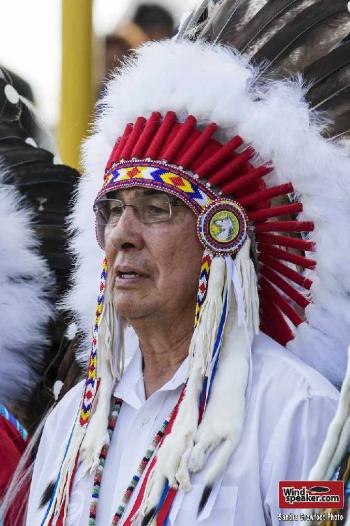Image Caption
By Sam Laskaris
Windspeaker Contributor
WINNIPEG
A soon-to-be Indigenous inductee into Canada’s Sports Hall of Fame will be delivering the keynote address at a prestigious sporting convention in Winnipeg.
In late April it was announced that Wilton Littlechild will be one of this year’s inductees into the national sports hall of fame. Induction ceremonies will be staged Oct. 18 in Toronto.
Littlechild, a prominent Indigenous sports activist who is from Alberta’s Ermineskin Cree Nation, will be the headline speaker at the 46th annual North American Society for Sport History (NASSH) convention, which begins on Friday and continues until Monday.
Littlechild, who is better known by his nickname Willie, is the Grand Chief of the Confederacy of Treaty Six Nations. He will deliver his keynote address on Saturday.
The University of Manitoba’s faculty of kinesiology and recreation management will be hosting the convention, which will be held at Winnipeg’s Fort Garry Hotel.
The convention is preceded by a two-day pre-conference workshop titled Indigenous Resurgence, Regeneration, and Decolonization through Sport History.
This event, which began Wednesday and continues Thursday, is being held at the University of Manitoba.
Dr. Russell Field, the convention co-ordinator, is thrilled that Littlechild will be speaking.
“I think it means a lot for us partly because he’s getting inducted into Canada’s Sports Hall of Fame this year but as much as anything because the conference is in Winnipeg.”
The city is the home of the National Centre for Truth and Reconciliation. Littlechild sat as a commissioner of the TRC.
Also, the University of Manitoba campuses are located on Treaty 1 territory and are the original lands of Anishinaabeg, Cree, Oji-Cree, Dakota, and Dene peoples. The school is also on the homeland of the Métis Nation.
The mandate of the North American Society for Sport History is to promote, stimulate, and encourage study, research, and writing on the history of sport. It also supports and co-operates with organizations at the international, national and local levels, which have similar purposes.
The annual NASSH convention rotates to a different North American city each year. This marks the first time it is being held in Winnipeg.
The last NASSH convention in Canada was in 2013 in Halifax.
During his keynote address, Littlechild has been allotted 90 minutes to speak. His speech is titled The Importance of Sport in Truth and Reconciliation.
Littlechild, who in 1976 became Alberta’s first treaty First Nations individual to become a lawyer, was also a federal politician, serving in Parliament from 1988 to 1993.
In his younger days Littlechild, who had attended residential schools from 1951 to 1964, ended up playing hockey and was also on the swim team while he was at the University of Alberta. He also worked as the student manager for the university’s football and men’s basketball teams.
Littlechild, who will be inducted into the national sports hall of fame via the builders’ category, was an instrumental figure in helping to establish a pair of prestigious Indigenous sporting events.
He helped launch the North American Indigenous Games first held in 1990, as well as the World Indigenous Nations Games, which debuted in 2015.
About 200 people are expected to attend the NASSH convention. Besides Canada, the United States and Mexico delegates will also be coming from Australia, Denmark, England and Germany.
Meanwhile, 20 people are attending the pre-conference workshop. Ten of those individuals are workshopping their research papers.
The plans is to publish those works in a special edition of the Journal of Sport History. This academic publication is expected to be out at some point in 2019.
“It will be a special issue dedicated to this topic,” Field said.
When Winnipeg was awarded the NASSH convention, organizers were allowed to choose their own focus for the pre-conference workshop, said Field.
“It seemed like the obvious choice,” the selection of the workshop Indigenous Resurgence, Regeneration, and Decolonization through Sport History.
The keynote address delivered Wednesday was from Eugene Arcand, from Saskatchewan’s Muskeg Lake Cree Nation.
Arcand, also a residential school survivor, spoke about the importance of sports in his upbringing.
“He told us an incredible story and told us to do good work from an ethical place,” Field said.
Arcand is a member of the Governing Circle of the National Centre for Truth and Reconciliation and an inductee into the First Nation Sports Hall of Fame.
The closing banquet for the convention will be held Monday at the Canadian Museum for Human Rights.
Convention attendees will be able to tour the museum beforehand.

